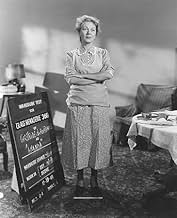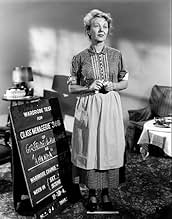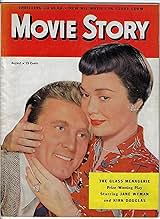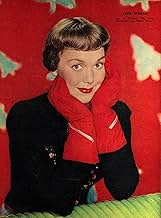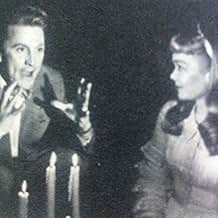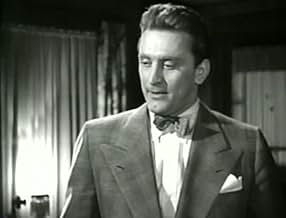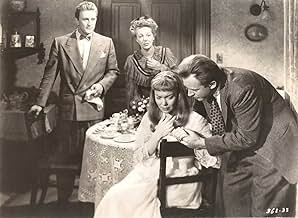VALUTAZIONE IMDb
7,0/10
1339
LA TUA VALUTAZIONE
Aggiungi una trama nella tua linguaMerchant marine officer Tom Wingfield reminisces about his life in St. Louis where he had lived with his nagging mother Amanda and crippled shy sister Laura.Merchant marine officer Tom Wingfield reminisces about his life in St. Louis where he had lived with his nagging mother Amanda and crippled shy sister Laura.Merchant marine officer Tom Wingfield reminisces about his life in St. Louis where he had lived with his nagging mother Amanda and crippled shy sister Laura.
- Regia
- Sceneggiatura
- Star
- Premi
- 1 vittoria in totale
Philip Ahn
- Sailor
- (non citato nei titoli originali)
Chris Alcaide
- Eddie
- (non citato nei titoli originali)
Richard Bartell
- Barman
- (non citato nei titoli originali)
Peter Camlin
- Sailor
- (non citato nei titoli originali)
Perdita Chandler
- Girl in Bar
- (non citato nei titoli originali)
Victor Desny
- Sailor
- (non citato nei titoli originali)
Sarah Edwards
- Mrs. Miller
- (non citato nei titoli originali)
James Horne Jr.
- A Caller
- (non citato nei titoli originali)
Louise Lorimer
- Miss Porter
- (non citato nei titoli originali)
Sean McClory
- Richard
- (non citato nei titoli originali)
Recensioni in evidenza
One of Tennessee Williams' best plays becomes a good but not great film despite a stellar cast. It's hard to pin exactly why this film doesn't soar but it's a solid screen version. Maybe it's just that the subject matter works better in a stage environment and that the camera is just too intimate.
Familiar story of restless son, his crippled sister, and their manic mother, who seems to live in the golden past is great material for the stage. And this sad story of the mother's attempts to goad the son into bringing home a young man to meet the sister seems rather cruel. But even the forgotten and lost can lead lives of desperation as they cling to dreams and make wishes on silver moons.
Arthur Kennedy stars as Tom, the son who tries to please his mother but longs to escape his dull job in St. Louis and see the world. Jane Wyman is the crippled sister who has shrunk from the world and collects tiny glass animals. Gertrude Lawrence is the mother who was abandoned by her husband and has been reduced to living in a dumpy apartment and selling magazine subscriptions. And Kirk Douglas is the "gentleman caller." All 4 actors are quite good, although none received Oscar nominations, despite the hype. Many great actresses have been associated with the role of Amanda Wingfield since this play made its Broadway debut in the 1940s: Laurette Taylor, Katharine Hepburn, Joanne Woodward, Maureen Stapletobm Jessica Tandy, Julie Harris, and Jessica Lange have all played the role on stage, film, or TV. And I swear I remember Shirley Booth doing this on TV also.
Ultimetaely the story is as fragile as the glass figures. If any one character dominates the story the whole play collapses. This film version works very well in balancing the roles. And while Wyman seems a tad old for the part, Lawrence was an even odder choice. I've also read that Bette Davis and Tallulah Bankhead were considered. But how they decided on Lawrence--a great musical comedy star in London and New York--is anyone's guess. She really is quite good but the film might have need the extra star power of Bette Davis.
Anyway, this classic American play is worth watching.
Familiar story of restless son, his crippled sister, and their manic mother, who seems to live in the golden past is great material for the stage. And this sad story of the mother's attempts to goad the son into bringing home a young man to meet the sister seems rather cruel. But even the forgotten and lost can lead lives of desperation as they cling to dreams and make wishes on silver moons.
Arthur Kennedy stars as Tom, the son who tries to please his mother but longs to escape his dull job in St. Louis and see the world. Jane Wyman is the crippled sister who has shrunk from the world and collects tiny glass animals. Gertrude Lawrence is the mother who was abandoned by her husband and has been reduced to living in a dumpy apartment and selling magazine subscriptions. And Kirk Douglas is the "gentleman caller." All 4 actors are quite good, although none received Oscar nominations, despite the hype. Many great actresses have been associated with the role of Amanda Wingfield since this play made its Broadway debut in the 1940s: Laurette Taylor, Katharine Hepburn, Joanne Woodward, Maureen Stapletobm Jessica Tandy, Julie Harris, and Jessica Lange have all played the role on stage, film, or TV. And I swear I remember Shirley Booth doing this on TV also.
Ultimetaely the story is as fragile as the glass figures. If any one character dominates the story the whole play collapses. This film version works very well in balancing the roles. And while Wyman seems a tad old for the part, Lawrence was an even odder choice. I've also read that Bette Davis and Tallulah Bankhead were considered. But how they decided on Lawrence--a great musical comedy star in London and New York--is anyone's guess. She really is quite good but the film might have need the extra star power of Bette Davis.
Anyway, this classic American play is worth watching.
Glass Menagerie, The (1950)
*** (out of 4)
Excellent performances make up for a slow pace in this adaptation of the Tennessee Williams play. An aging Southern Belle (Gertrude Lawrence) makes life horrible for her ambitious son (Arthur Kennedy) and crippled daughter (Jane Wyman) because of her dreams of what life should be. She hopes to get her daughter married off, unable to see her faults and she thinks she has a shot when her son bring home a man (Kirk Douglas) he works with. I really wasn't sure what to expect from this film after reading a few negative reviews but I was pleasantly surprised to see that it was worth watching due in large part to the terrific performances by the entire cast. I was really shocked to see how well the entire cast handled the dialogue and how easy it came off for everyone. Lawrence really stands out as the overbearing mother who you just want to hate yet she's so annoying that she becomes charming after a while. I thought Lawrence did a terrific job at playing both sides of the coin because you do hate her for the way she treats her children but when the stranger shows up, she changes to someone completely different. Just check her performance when this stranger tells her something she didn't know. Wyman is also excellent as the shy and cripple daughter. She too got into the role quite well and made us believe everything about the character. Both Kennedy and Douglas also turn in fine performance and most importantly is how well all four act together. I think director Rapper could have pushed the film a little faster as the pace gets very slow after a while but this is just a small complaint. As with many of Williams' stories, this one here had quite a bit cut out to get pass the censors but in the end this is still worth viewing thanks to the cast.
*** (out of 4)
Excellent performances make up for a slow pace in this adaptation of the Tennessee Williams play. An aging Southern Belle (Gertrude Lawrence) makes life horrible for her ambitious son (Arthur Kennedy) and crippled daughter (Jane Wyman) because of her dreams of what life should be. She hopes to get her daughter married off, unable to see her faults and she thinks she has a shot when her son bring home a man (Kirk Douglas) he works with. I really wasn't sure what to expect from this film after reading a few negative reviews but I was pleasantly surprised to see that it was worth watching due in large part to the terrific performances by the entire cast. I was really shocked to see how well the entire cast handled the dialogue and how easy it came off for everyone. Lawrence really stands out as the overbearing mother who you just want to hate yet she's so annoying that she becomes charming after a while. I thought Lawrence did a terrific job at playing both sides of the coin because you do hate her for the way she treats her children but when the stranger shows up, she changes to someone completely different. Just check her performance when this stranger tells her something she didn't know. Wyman is also excellent as the shy and cripple daughter. She too got into the role quite well and made us believe everything about the character. Both Kennedy and Douglas also turn in fine performance and most importantly is how well all four act together. I think director Rapper could have pushed the film a little faster as the pace gets very slow after a while but this is just a small complaint. As with many of Williams' stories, this one here had quite a bit cut out to get pass the censors but in the end this is still worth viewing thanks to the cast.
Gertrude Lawrence only made 13 films in her career, but she was beloved for her stage performances in England and on Broadway. The English-born actress does a fantastic job with her southern accent as Amanda Wingfield. She plays the perfect nagging yet doting mother in "The Glass Menagerie."
Jane Wyman plays her daughter, Laura, and Arthur Kennedy is her son, Tom. The cast of this first film of the play is rounded out with Kirk Douglas as Jim O'Connor and Ralph Sanford as Mendoza. With this superb cast, this may be the best film rendition of the Tennessee Williams story on which the film is based.
One drawback is its revised ending that leaves a question in the viewers mind. So, what eventually happened to Amanda and Laura? And, I agree with observations by some that the effort to make Lawrence appear younger is a negative. Especially when she gets dolled up for the dinner evening with their guest, Jim O'Connor.
Lawrence was well liked by audiences as a dramatic and comedy performer. Besides the stage and films, she played nightclubs and sang. She won a Tony for her starring role in the original Broadway production of "The King and I" opposite Yul Brynner.
But, Lawrence made so few films, that there aren't many examples of her acting talent available otherwise. This version of "The Glass Menagerie" may be the best example for movie buffs to see a performance by this fine British star of stage and screen.
Lawrence died at age 52 of cancer. She lived a high life, well beyond her substantial means, and was deeply in debt most of her life.
Here's a favorite line from the film. Jim O'Connor, Ah, when you first meet Mendoza, you don't like him. But, when you get to know him, you hate him."
Jane Wyman plays her daughter, Laura, and Arthur Kennedy is her son, Tom. The cast of this first film of the play is rounded out with Kirk Douglas as Jim O'Connor and Ralph Sanford as Mendoza. With this superb cast, this may be the best film rendition of the Tennessee Williams story on which the film is based.
One drawback is its revised ending that leaves a question in the viewers mind. So, what eventually happened to Amanda and Laura? And, I agree with observations by some that the effort to make Lawrence appear younger is a negative. Especially when she gets dolled up for the dinner evening with their guest, Jim O'Connor.
Lawrence was well liked by audiences as a dramatic and comedy performer. Besides the stage and films, she played nightclubs and sang. She won a Tony for her starring role in the original Broadway production of "The King and I" opposite Yul Brynner.
But, Lawrence made so few films, that there aren't many examples of her acting talent available otherwise. This version of "The Glass Menagerie" may be the best example for movie buffs to see a performance by this fine British star of stage and screen.
Lawrence died at age 52 of cancer. She lived a high life, well beyond her substantial means, and was deeply in debt most of her life.
Here's a favorite line from the film. Jim O'Connor, Ah, when you first meet Mendoza, you don't like him. But, when you get to know him, you hate him."
As a result of the numerous re-makes of this haunting classic this original film version is often overlooked. Irving Rapper's delicate direction and economical style are the perfect compliments to Tennessee Williams' haunting prose. While Paul Newman's more recent filming of The Glass Menagerie with wife Joanne Woodward is more faithful to the play's text, his use of colour and a much weaker supporting cast makes the 1950 version more compelling viewing. The talented Karen Allen is not nearly as heartbreaking as Academy Award winner Jane Wyman in the crucial role of Laura. Arthur Kennedy and Kirk Douglas also out perform their more contemporary counterparts. Having now seen a number of actresses fail to live up to the considerable challenges of playing Amanda Wingfield it is easier to appreciate the virtues of the rather miscast Gertrude Lawrence(the film producers had wanted Tallulah Bankhead but felt her unfit to complete filming, they also wanted Bette Davis but her falling out with Jack Warner left her out of the running).According to Elia Kazan a nervous Charles Feldman re-cut the film thus somewhat compromising its integrity. However even with its flaws it is the only filmed version which fully captures the tragic atmosphere of Williams' brilliant play.
I got spoiled when I watched 1973's The Glass Menagerie; the 1950 version didn't stand a chance when I finally rented it. Katharine Hepburn's class, Sam Waterston's passion, and Joanna Miles's shyness are incomparable. Halfway through the 1950 version with Gertrude Lawrence, Arthur Kennedy, and Jane Wyman, I stopped my curses and comparisons to the taped Broadway performance. I suddenly realized that the earlier version was the original, and since it came first, it deserved fresh eyes and an open mind. With that in mind, I made sure to be less critical during the second half of the movie.
The Glass Menagerie is a Tennessee Williams play, so it's a depressing family drama about a struggling family in the South, in particular, a frustrated young man and his overbearing mother. The patriarch has deserted the family decades ago, and the young man has given up his dreams to work in a factory and take care of his mother and crippled sister.
While in the '70s, Sam Waterston played the character as a young man who sacrificed his youth for his family and doesn't want that pattern to continue for the rest of his life, Arthur Kennedy comes across as an older character, one whose youth has long since passed by. He isn't passionate and desperate to break free; he's resigned to his fate, but still unhappy about it. It's a very different interpretation from the way Sam played the part, but it's equally good. I'm not one to use the phrase "apples and oranges", but in his own way, Arthur does just as good a job as Sam.
The way Katharine Hepburn played her character, audiences can see how charming she used to be in her youthful Southern belle days. She still retains her class and poise in her old age. Gertrude Lawrence is more beaten down and shabby, fitting in with her poor surroundings. Katharine Hepburn is in a league of her own, but Gertrude Lawrence does give a good performance.
I couldn't really come up with a reason for Jane Wyman's interpretation of the sister character. She hardly seemed shy, and she seemed more mentally slow than anything, from her wide-eyed blank stare at her mother, to her sudden fits with no subtle build-up, and the variance of her limp. The one person who was hands-down, no-contest, infinitely better than the Broadway revival was Kirk Douglas, who played the gentleman caller. While he has the smallest part in the show, and he's given so many wonderful performances over the years, I hesitate to say this is one of his best performances, but it's certainly one of his most underrated ones. Usually, Kirk Douglas is either remembered as a bad boy or in a loincloth. In The Glass Menagerie, he plays the absolute antithesis of his usual bad boy roles, and he's fantastic. He aces every facet of his written character. He's supposed to be perfect and wondrous and kind, the image that comes to mind when one thinks of the bygone name "gentleman caller". A gentleman caller is polite, amiable, clean cut, confident, entertaining, and says nothing that couldn't be overheard by your parents. There isn't a hint of rebellion or seduction in Kirk Douglas's performance, and he sets the bar so high no one else can ever hope to play the gentleman caller half as well.
All in all, this version of The Glass Menagerie is pretty good, unless you've seen the 1973 version and believe that's the one and only interpretation. You might want to watch this one first, or just keep an open mind after the remake. Kirk Douglas fans will definitely want to rent this, and if you really like the story, as I do, you might enjoy watching every version you can get your hands on.
The Glass Menagerie is a Tennessee Williams play, so it's a depressing family drama about a struggling family in the South, in particular, a frustrated young man and his overbearing mother. The patriarch has deserted the family decades ago, and the young man has given up his dreams to work in a factory and take care of his mother and crippled sister.
While in the '70s, Sam Waterston played the character as a young man who sacrificed his youth for his family and doesn't want that pattern to continue for the rest of his life, Arthur Kennedy comes across as an older character, one whose youth has long since passed by. He isn't passionate and desperate to break free; he's resigned to his fate, but still unhappy about it. It's a very different interpretation from the way Sam played the part, but it's equally good. I'm not one to use the phrase "apples and oranges", but in his own way, Arthur does just as good a job as Sam.
The way Katharine Hepburn played her character, audiences can see how charming she used to be in her youthful Southern belle days. She still retains her class and poise in her old age. Gertrude Lawrence is more beaten down and shabby, fitting in with her poor surroundings. Katharine Hepburn is in a league of her own, but Gertrude Lawrence does give a good performance.
I couldn't really come up with a reason for Jane Wyman's interpretation of the sister character. She hardly seemed shy, and she seemed more mentally slow than anything, from her wide-eyed blank stare at her mother, to her sudden fits with no subtle build-up, and the variance of her limp. The one person who was hands-down, no-contest, infinitely better than the Broadway revival was Kirk Douglas, who played the gentleman caller. While he has the smallest part in the show, and he's given so many wonderful performances over the years, I hesitate to say this is one of his best performances, but it's certainly one of his most underrated ones. Usually, Kirk Douglas is either remembered as a bad boy or in a loincloth. In The Glass Menagerie, he plays the absolute antithesis of his usual bad boy roles, and he's fantastic. He aces every facet of his written character. He's supposed to be perfect and wondrous and kind, the image that comes to mind when one thinks of the bygone name "gentleman caller". A gentleman caller is polite, amiable, clean cut, confident, entertaining, and says nothing that couldn't be overheard by your parents. There isn't a hint of rebellion or seduction in Kirk Douglas's performance, and he sets the bar so high no one else can ever hope to play the gentleman caller half as well.
All in all, this version of The Glass Menagerie is pretty good, unless you've seen the 1973 version and believe that's the one and only interpretation. You might want to watch this one first, or just keep an open mind after the remake. Kirk Douglas fans will definitely want to rent this, and if you really like the story, as I do, you might enjoy watching every version you can get your hands on.
Lo sapevi?
- QuizIn his 1988 autobiography "The Ragman's Son," Kirk Douglas says that he thinks that the effectiveness of this movie was hampered by Gertrude Lawrence's vanity, since the filmmakers were obliged to add scenes that made her character look younger and more appealing. Douglas also says that he prefers the 1987 film version directed by Paul Newman.
- Citazioni
Jim O'Connor: Ah, when you first meet Mendoza, you don't like him. But, when you get to know him, you hate him.
- ConnessioniFeatures Figlia del vento (1938)
I più visti
Accedi per valutare e creare un elenco di titoli salvati per ottenere consigli personalizzati
- How long is The Glass Menagerie?Powered by Alexa
Dettagli
- Data di uscita
- Paese di origine
- Sito ufficiale
- Lingua
- Celebre anche come
- The Glass Menagerie
- Luoghi delle riprese
- Azienda produttrice
- Vedi altri crediti dell’azienda su IMDbPro
Botteghino
- Budget
- 1.357.000 USD (previsto)
- Tempo di esecuzione
- 1h 47min(107 min)
- Colore
- Proporzioni
- 1.37 : 1
Contribuisci a questa pagina
Suggerisci una modifica o aggiungi i contenuti mancanti

